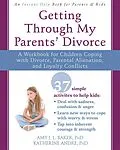Is your child stuck in the middle of a high-conflict divorce? In Getting Through My Parents' Divorce, two psychologists and experts in parental alienation offer a fun and engaging workbook to help kids work through stressful or confusing emotions and feel safe and loved-no matter what.
Divorce is never easy. But for kids who have parents in conflict with one another, or where one parent is so hostile that he or she is actively trying to undermine the kids' relationship with the other parent, divorce can be unbearable. This workbook is designed especially for kids, and includes helpful tips and exercises to help them deal with the negative impact of custody disputes, understand and identify their feelings, learn to cope with stress and other complex emotions, and feel secure.
Written by two leading experts in child psychology, this easy-to-use workbook includes a number of helpful suggestions to guide children though a number of possible scenarios, such as what to do if one parent says mean and untrue things about the other parent; what to do if a parent asks them to keep secrets from another parent; or what to do if one parent attempts to replace the other parent with a new spouse.
If you have or know a child that is dealing with a difficult divorce, this workbook will give them the tools needed to move past loyalty conflicts and the difficult emotions that can arise when parents don't get along.
Autorentext
Katherine C. Andre, PhD, is a licensed psychologist in clinical practice for over twenty years. She has worked extensively with families to prevent parental alienation before it begins and to strengthen parent/child relationships with both parents. As a court-appointed child custody director and mediator, she has supervised other mediators and helped parents to develop healthy parenting plans in their children's best interest. She holds a bimonthly class on parenting that teaches parents the importance of keeping their children out of conflict. She has published articles on parental alienation in the Annals of the American Psychotherapy Association and The California Psychologist, and has made contributions on parental alienation to other publications. She graduated from the College of William and Mary, and received her PhD from the University of Georgia with an area of specialization in child neuropsychology.
